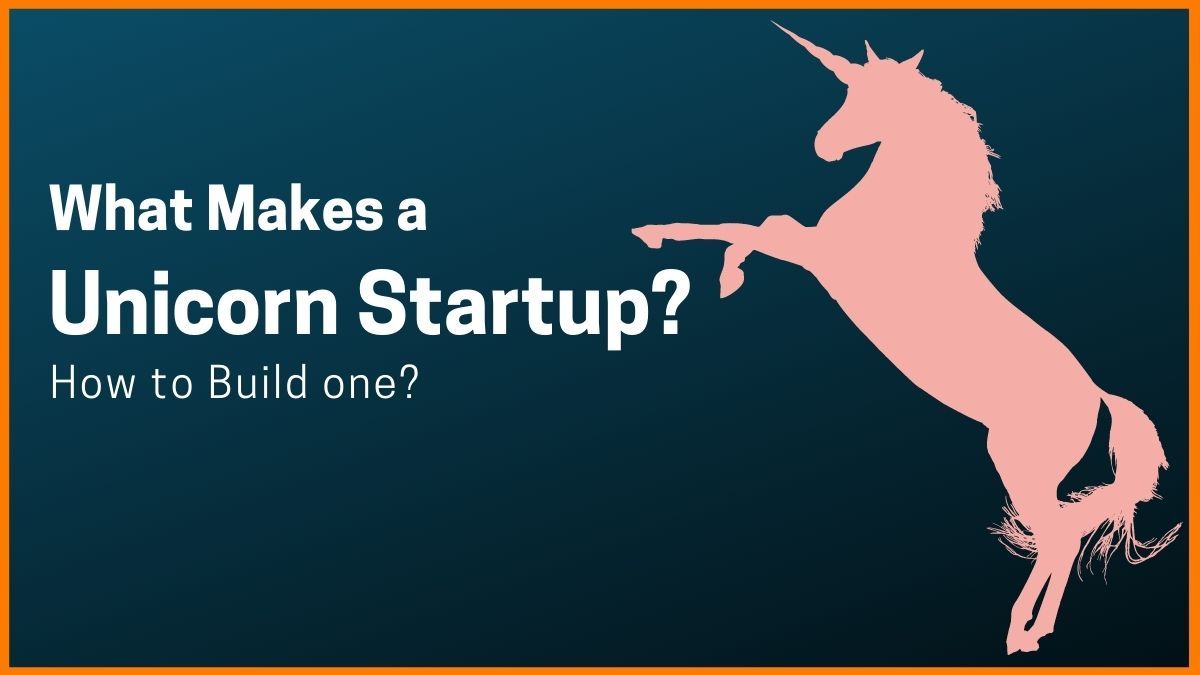What Makes A Unicorn Startup & How To Build One
🔍Insights
People know about popular unicorn companies like Uber, Swiggy, Airbnb, Snapchat, and Pinterest and their journey to success, but most people don't know what a unicorn company exactly means. What are the different criteria for a startup company to become a unicorn? A unicorn in the Business world indicates a privately owned startup company that has a valuation of $1 billion.
The term was initially coined by a well-known venture capitalist Aileen Lee, who choose the mythical animal to represent the statistical rarity of successful startup companies. The simplest definition of a startup has remained unchanged ever since, while the number of unicorns has gone up. Unicorn has now become a catchphrase within the global startup market. When a startup becomes a unicorn, it shows how the business model of the company and its value proposition is in the eyes of the investors. The unicorn helps grows in both visibility and operational outlay, which often leads directly to greater business opportunities for the organization.
The article ahead will give you an insight on How to become a Unicorn Startup, the Features & Characteristics of a Unicorn Company, and more.
The Characteristics of Unicorn Startup
Investors of the Unicorn Companies
Can Only Startups be a Unicorn?
Disruption and Value Seeding
Market Size of the Unicorn Companies
Maximizes Growth and Net Profit
Which Indian Startups turned Unicorn in 2021?
FAQ's
Conclusion
The Characteristics of Unicorn Startup
The process to be a unicorn is not easy and each and every unicorn has its own story. All the unicorn companies have a similar set of features that makes them a unicorn startup.
- Groundbreaking innovations: The unicorn companies have brought a disruption in the field they belong to. Uber, for example, changed the way people commuted. While Airbnb is known to have changed the way people planned their way while traveling. The innovative strategies are what make them a unicorn company.
- The First innovations: The unicorn companies are mostly the starters in their industry. They change the way people do things and gradually create a necessity for themselves. They are also known to continuously innovate and stay ahead of competitors which might later boom.
- High Technology: Most unicorn companies have a business model run on a higher level of technology. Almost 87% of the unicorn products are software, 7% of them being hardware, while the other 6% of them being based on products and services.
- Consumer-focused startups: Their main goal into simplify and make things easy for consumers and be a part of their day-to-day life. Over 62% of the unicorns are particularly B2C companies. Another key ingredient is keeping their products and services affordable.
- Privately owned: Many known unicorn companies are nowadays privately owned which gets their valuation bigger when an established company invests in it. There are more than 361 private companies around the world valued at over $1 billion. India has 16 of these companies, that are taking up 4% of the overall share.

Key ingredients of a Unicorn
- To make a simple solution to an existing problem
- Make a strong and highly marketable value proposition
- Make a plan in order to have a clear vision for the future of the company and the products and services they offer
- Unicorn companies have Potential beta testers and customers
- They usually have an easy-to-use UX that allows users to quickly adapt and get the product.
Investors of the Unicorn Companies
Great ideas usually don’t have value until you do something with them, which is what the unicorns companies are good at as they have the right people, skills, tools, and data to make the magic happen. This is taken into consideration by the investors for deciding which startup to fund. It is very important to project revenue and growth.
Some projections need to be backed by hard data and the forecasting growth for the next 6, 12, or 18 months. If a startup in need of funding without any numbers to back up its claims, the potential investor may not be interested in good. Recent startups wait in order to seek out investors until they have a marketable product with proven demand as well as a number of opportunities coming your way.

Can Only Startups be a Unicorn?
The answer is yes because the unicorn is a term given only to startups who have a valuation of over a billion. The only startups that have a valuation of 10 billion are grouped under the term called decacon (which is a super unicorn). Dropbox, SpaceX, and WeWork are some examples of decacon.
For the startups that are based out of Canada, there is an exclusive term for what we call a unicorn. It is the narwhal. This means that any Canadian startup company with a valuation of over 1 billion is called a narwhal. Some of the famous narwhale companies are Hootsuite and Wattpad.

Which Indian Startups turned Unicorn 2021?

Here's the list of Top Unicorn Startups in India 2021
Disruption and Value Seeding
The main reason behind the growth and success of each and every unicorn is the disruptive impact it has on its chosen market. A well-known example of this is the on-demand taxi aggregator Uber. Uber uses smartphones as a medium to connect consumers with their nearby cab drivers at the touch of the button, the only reason that has driven the massive success that the company continues to enjoy.
Uber not only made booking a cab booking more convenient for the end-user but also headed more operational efficiency for cab drivers and taxi service providers by helping them optimize their revenue streams. As a result, the company is now one of the most successful unicorns with a valuation of 64.5 billion in 2020.
Market Size of the Unicorn Companies
It is important for startups aspiring to make the title of a unicorn in order to analyze the market they are operating in. Entrepreneurs must understand and analyze their target markets well in advance in order to aim for the title of a unicorn in order to analyze the markets they are operating in. They must analyze their target market and target audience well in advice before aiming to make their startups into the next big thing in the startup community.
An example of the is Airbnb. Founded as an alternative lodging/hotel solution for business travelers all over the world, the company then changed its approach to target the much larger global hotel industry, which is currently worth 550 million.

Maximizes Growth and Net Profit
There no fixed rule that requires a company to be profitable in order to become a unicorn. In fact one of the earliest unicorns, Nutanix earned the status in 2013 despite a complete lack of profits. The point is that profits and growth don’t always go hand in hand. In fact, going after profit can sometimes slow your ability to increase revenue.
The startups must work towards building sustainable growth rather than opting for a quick, short-sighted bump in profits. Instead of only focusing on growing your margins to impress investors with fast ROI, they must also focus on perfecting your product, increasing your total revenue, and growing your user base.
FAQ's
What is a startup unicorn?
A term that describes a privately-owned startup with a valuation of over $1 billion.
What is a unicorn in a startup?
In finance, “unicorn” is a term that describes a privately-owned startup. The term was introduced by venture capital investor, Aileen Lee, in 2013 to describe rare tech startups that were valued at more than $1 billion. The phenomenon of unicorns is quite controversial.
Which Indian startup became unicorns in 2020?
In all, 11 Indian startups — Unacademy, Pine Labs, FirstCry, Zenoti, Nykaa, Postman, Zerodha, Razorpay, Cars24, Dailyhunt, and Glance — became unicorns this year.
Which is India's fastest Unicorn startup?
Bengaluru and San Francisco-based SaaS startup Postman became the fastest SaaS startup to reach unicorn status. In June 2020, the six-year-old startup secured a Series C funding of $150 million at a valuation of $2 billion.
Which country has the most unicorns?
The number of unicorn companies found in China in early 2020 was bigger than those of 29 other countries, including Germany, India, and the UK, combined.
Conclusion
Hope you got an idea on how to build a unicorn startup & what are the unicorn startups' characteristics. Startups into tech will now embrace machine intelligence mostly in its devices or products. Artificial intelligence is the future and is making innovations in the tech industry for years. But its presence will become more in the coming years. This in turn will give rise to unicorn startups which will dominant the startup industry. The moto is not to make unicorn startups but to create something that takes away the human effort by making the world a little better.
Must have tools for startups - Recommended by StartupTalky
- Convert Visitors into Leads- SeizeLead
- Website Builder SquareSpace
- Run your business Smoothly Systeme.io
- Stock Images Shutterstock







